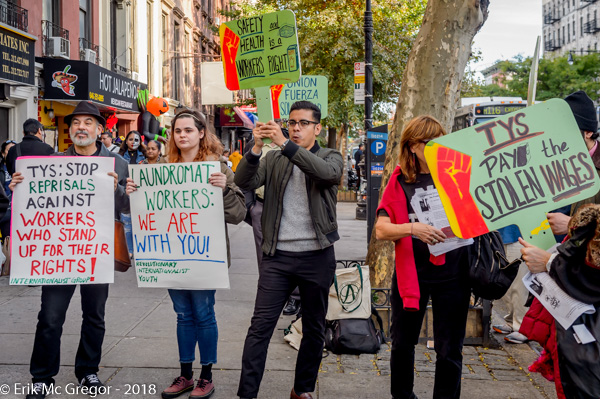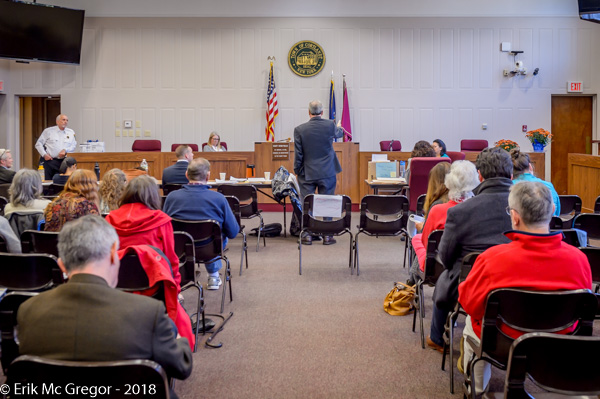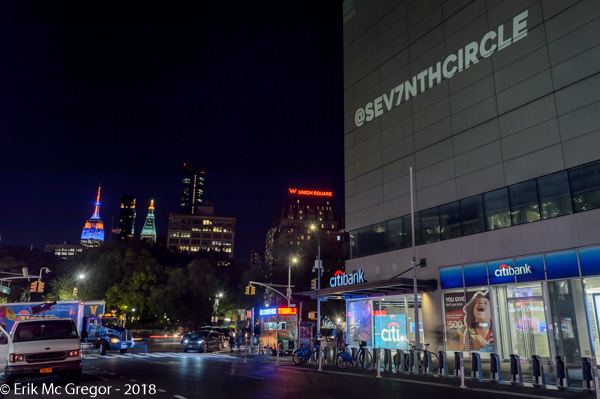Indigenous Women’s Delegation takes fossil fuel divestment demands to Chase Bank’s doorstep
PLEASE CONSIDER SUPPORTING MY WORK
New York, NY - The indigenous Women's Divestment Delegation, facilitated by Women's Earth and Climate Action Network (WECAN), along with environmental organizations in NYC and national organization Rainforest Action Network stood together on October 15,2018 to demand JPMorgan Chase divest from fossil fuels. Six women leaders, from the frontlines of pipeline battles across the nation, spoke out and disrupted Chase Bank’s Private Client offices in the landmarked 28 Liberty building downtown.
Today the Canadian company, Enbridge is seeking to renew its credit with Chase in order to complete the Line 3 expansion pipeline. Enbridge’s Line 3 Replacement is dangerously similar to Keystone XL. They are both proposed 36” transborder pipelines which would carry heavy tar sands crude oil from Canada through the United States and across delicate water, land, and cultural resources, with some oil potentially bound for export. Despite harsh public backlash and environmental warnings from the disastrous KXL and DAPL fights, banks like JPMorgan Chase refuse to learn and continue funding outdated and dangerous pipelines.
JPMorgan Chase should prohibit all financing for companies with current or planned operations in the tar sands sector, in recognition of its environmental, social, and growing financial risks.
This rallying cry from the fourth Indigenous Women’s Divestment Delegation launches their mission to New York City and Washington D.C. from October 15-17th, to take part in high-level meetings engaging the Equator Principle Association banks (EP banks) and the credit rating agency MSCI, regarding fossil fuel developments; Indigenous and human rights violations; dangers to increasing climate chaos; and demands for institutional action to change the harmful financing practices supporting extractive industries.
The call from the Indigenous Women’s Divestment Delegation is for rights and environmental violations to be more thoroughly reflected in the rating scores given to fossil fuel extraction companies. Such shifts in rating agency procedures would act as as one tool to contribute to the continued divestment of funds from unjust and dangerous extractive corporations and projects.
JPMorgan Chase, Wall Street’s worst offender when it comes to funding tar sands, and French bank Crédit Agricole are joint bookrunners and lead arrangers for the line of credit for Enbridge Energy Partners.
* The Mille Lacs, White Earth, and Red Lake tribes in Minnesota whose lands would be crossed by the pipeline are all strongly opposed to the pipeline due to its impact upon their territories, especially the culturally significant wild rice beds.
* The opposition of three Ojibwe tribes demonstrates that Enbridge’s Line 3 project violates the internationally recognized principle of Free, Prior and Informed Consent for impacted Indigenous peoples.
* Environmentalists and landowners along the proposed route, oppose the project.
Minnesota’s commerce department has concluded that the state does not need the project, and an Administrative Law Judge had ruled that the state’s Public Utility Commission should deny Enbridge its preferred route.
“Enbridge has the only fully approved, fully funded major tar sands line in North America. It is a 1/3 owner in Dakota Access, and therefore a 1/3 owner in the brutality on unarmed people that took place in Standing Rock. Enbridge now plans to send almost one million barrels of oil per day through my people’s treaty territory, against the will of the tribes and people. Enbridge holds an A credit rating. No bank with even the most basic respect for human rights should be funding this company.” - Tara Houska (Couchiching First Nation Anishinaabe, Tribal attorney, National Campaigns Director of Honor the Earth, and former advisor on Native American affairs to Bernie Sanders)
“Divestment from dirty fossil fuel extraction and infrastructure demonstrates a commitment to our collective future and the web of life. What is needed immediately from financial institutions, insurance companies and rating agencies, is a show of leadership and dedication to ecological sustainability, and human and Indigenous rights, as we face the unprecedented challenges of a world plunging into climate chaos. Indigenous women have long bore the brunt of extractive industries, and despite this, shine powerfully with solutions to the harms that come from these destructive practices. Financial institutions, businesses, and governments need to listen to Indigenous women and adhere to their demands, which are founded on requests for basic respect for obtaining free, prior and informed consent of Indigenous communities, as required under international law. WECAN International stands with representatives of the ongoing Indigenous Women’s Divestment Delegations - and is calling for justice and accountability from institutions engaged in or enabling fossil fuel extraction. Business as usual cannot continue. Now is the time to move forward towards renewable, regenerative energy for all.” - Osprey Orielle Lake (Executive Director of the Women's Earth and Climate Action Network and Co-Director of the Divest, Invest, Protect campaign)

#Activism #Chase #ChaseBank #ClimateChange #ClimateCrisis #climatejustice #CorporateGreed #DefendTheSacred #DefundTarSands #divest #FossilFree #IndigenousRights #IndigenousRising #IndigenousWomen #JPMorgan #JPMorganChase #KeepItIntheGround #mniwiconi #NewYork #NoBayouBridge #NoDAPL #noKXL #NoPipelines #NoTarSands #NYC #PeacefulProtest #PeacefulResistance #peopleoverpipelines #ProtectTheSacred #RainforestActionNetwork #StopLine3 #stopLine3pipeline #StopTheBlackSnake #StopThePipeline #WaterIsLife
© Erik McGregor - erikrivas@hotmail.com - 917-225-8963














































